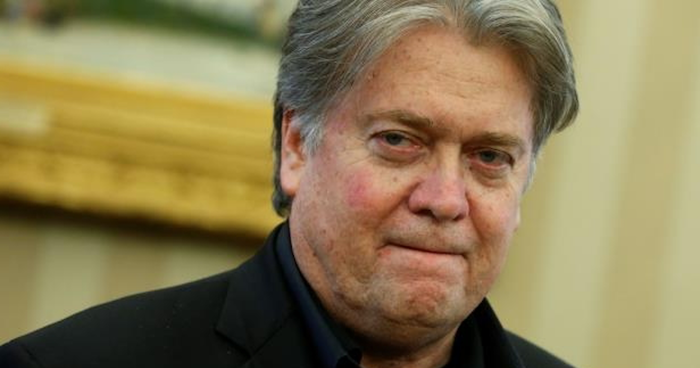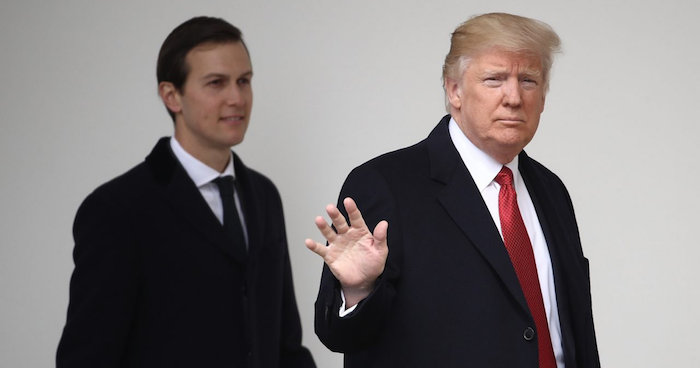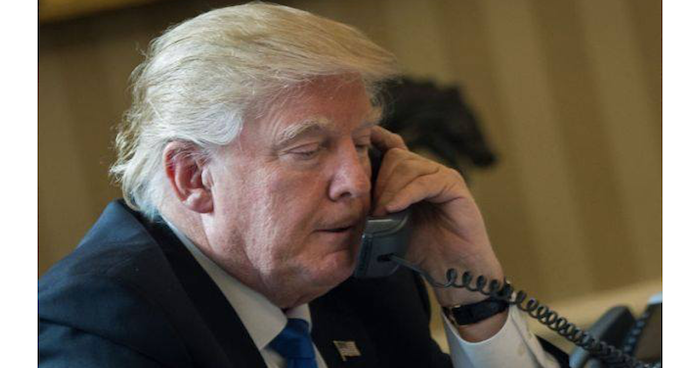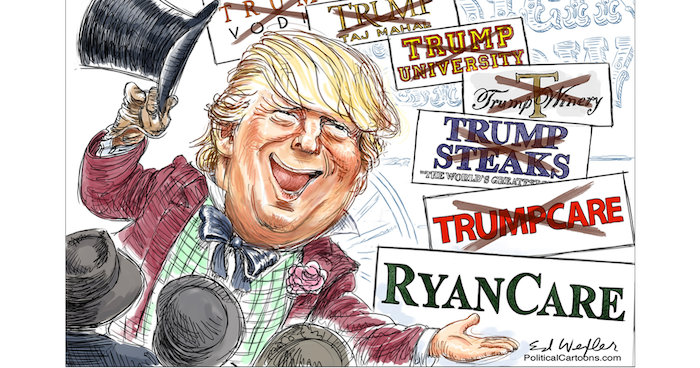|
Former Vice-President Dick Cheney told an audience yesterday that he was certain that Russia interfered in our election and that such interference in other people's elections is an "act of war." Is that also true when we do it?
By Jeff Deist Writing in The New York Times Magazine about last week’s stillborn RyanCare bill, Robert Draper recalls a conversation he had with White House strategist Stephen Bannon earlier this year. Bannon, lamenting the ability of both congressional Democrats and Republicans to get things done, contrasts the identity-obsessed progressives with the one-trick pony conservatives: What’s that Dostoyevsky line: Happy families are all the same, but unhappy families are unhappy in their own unique ways?” (He meant Tolstoy.) “I think the Democrats are fundamentally afflicted with the inability to discuss and have an adult conversation about economics and jobs, because they’re too consumed by identity politics. And then the Republicans, it’s all this theoretical Cato Institute, Austrian economics, limited government — which just doesn’t have any depth to it. They’re not living in the real world. There’s quite a lot to consider in these few sentences. For starters, Bannon clearly is not as familiar with the mindset of congressional Republicans as he imagines. They are primarily concerned with how the whole “repeal and replace” debacle plays back home. Bannon seems wholly unaware that incentives matter, that his only carrot or stick with regards to individual members is getting them reelected or un-elected. While Trump is likely to remain popular in deep red counties and states, it’s doubtful Bannon can leverage this to create an effective “enemies list” of GOP recalcitrants. For the majority of congressional Republicans the only existential threat to their jobs comes from their right flank in a potential primary, and supporting a watered-down version of the ACA may well hurt them worse than Bannon’s wrath. The only incentive that matters is reelection, not having “adult conversations or governing.” Is the wizened Bannon, architect of the brilliant Trump campaign, really so naïve about Congress? Second, Republicans in Congress hardly are under the spell of the Cato Institute or Austrian economics (undoubtedly Bannon sees these two things as synonymous, although they are not). We know Bannon has read Sun-Tzu and Aristotle, but has he read the Austrian literature he dismisses so casually? His notion that the GOP conference is full of ideologues, much less libertarian ideologues, is just flat false. The GOP is the party of trillion dollar military budgets, the party that wants to protect Social Security and Medicare-provided prescription drugs, the party that won’t even kill an openly cronyist program like the Export-Import Bank. The House Freedom Caucus, which arose from the remnants of Ron Paul’s liberty caucus, shows occasional libertarian tendencies. It has a worthy role to play as spoiler for bad bills like RyanCare, but it’s hardly an ideological driver in Congress. And Bannon, like so many political observers in the media, fails to understand how little think tanks influence policy in the Beltway. Organizations like the Brookings Institute, the American Enterprise Institute, and the Heritage Foundation are orders of magnitude larger than Cato, yet few in Congress really read their material more than superficially. The real game in DC doesn’t involve think tanks and public policy, it involves lobbyists quietly putting language into authorization and appropriations bills at the committee level. An anti-establishment maven like Bannon should know this. Third, Bannon’s use of the word “depth” belies a progressive longing for merging nation with state. And of course he’s right: Austrian economics per se, or any brand of economics, has very little to say about blood, culture, soil, language, and nationhood. Social science, at least honest social science, is not prescriptive. Economics can’t provide a normative system, political science can’t Make America Great Again. But the libertarian response to this is simple and direct — nation is not state. Greatness, even goodness, is outside the purview of government. Culture is beyond the realm of politics. Work, family, markets, and civil society are the foundations of a robust civilization, not the state. The deeper the state, the shallower the civilization — and vice versa. To the extent Bannon sees “limited government" and laissez-faire economics as abstractions that fail to provide a satisfactory worldview, it’s because he sees government as the organizing principle for society. It’s a grandiose view of statecraft that libertarians reject. Finally, there’s the old “not living in the real world” chestnut. How many times have libertarians heard this one? All around us are the almost unimaginable benefits of markets, cooperation, and technology, yet somehow we’re naïve if we don’t want to funnel human activity through government cattle chutes. The vast material and digital abundance we enjoy every day is provided without any state apparatus, in fact in spite of that apparatus. Is this private world not part of reality? Government is the artifice, and statists are the utopian dreamers who imagine that individuals acting under the magical banner of government can plan, coerce, and coordinate millions of lives. Realpolitik, Bannon’s idea of real-world governance, created a pile of several million bodies in the 20th century. If that’s the real world, perhaps it’s time to give libertarian theory a try. This article was originally published at The Mises Institute.
By Liberty Report Staff Living on borrowed money and borrowed time, the busts of 2000 and 2008 were just a hint of what's to come. Dr. Paul discusses the failure of Keynesian economics in the interview below. His segment begins around the 3:10 mark:
By Chris Rossini
President Trump is creating a new "White House Office of American Innovation" (read: a new bureaucracy) with his son-in-law Jared Kushner at the helm. Kushner said over the weekend: “The government should be run like a great American company.” Sorry, can't happen. It's literally an impossibility. Let us explore the many reasons why: First, government gets its "revenues" by force. It taxes everyone that happens to reside on the turf that government calls its own. If those individuals do not hand over their money, they run the risk of being thrown into a cage by the government. What a way to generate "revenue." No wonder so many misfits are attracted to this way of life. Companies, on the other hand, must earn their revenues. Individual consumers must voluntarily hand over their money to the company in exchange for a product or service. Each consumer has the ability to say "No" to the transaction. If a consumer doesn't like Wal-Mart or McDonald's, they are free to never (ever) step foot in either establishment. Wal-Mart and McDonald's are completely powerless to do anything about it. They can't lay a finger on you, let alone throw you in a cage. When it comes to government, however, a taxpayer can HATE Donald Trump, Barack Obama, or George W. Bush with a venomous passion, and it doesn't matter one bit. You can scream and shout until your voice box collapses, but you will cough up your taxes. Otherwise, off to the the cage you go. Companies go out of business all the time. It's very difficult to satisfy consumers profitably. Consumers are extremely fickle, always looking for the best deal. Consumers always want it cheaper, faster, and better. If a company is not able to keep their finger on the pulse of ever-changing consumer desires, they have to close their doors. There is no incentive for failure. Government, on the other hand, thrives on failure. When government fails, the incident is used as an excuse to take more money from the taxpayers. Budgets go up! The exact opposite of market incentives. The federal budget goes in one direction: UP. Republicans?....UP....Democrats?....UP.... This bizzaro setup cannot be "fixed." It can't be "tweaked" to work more efficiently. Government doesn't have market signals like profits and losses. Companies can quickly see what consumers really want versus what they don't. Profit and loss statements cannot lie. Government is all political. No profit & loss statements. It's pretty much all lies. This is why government should have very few (and almost no) responsibilities. Ideally, it would be so insignificant that you forget it even exists. That's at least how it originally was in the "land of the free." Unfortunately, after 240+ years, the "land of the free" has morphed into a land where government is viewed as a Mommy or Daddy. It's expected to be in charge of every photon and electron. Not even private conversations are allowed outside of its watchful eye. While the market, when left alone, will weed out failed companies, Government keeps crony companies in business! The market is ruthless. It shows no mercy. You either satisfy your customers profitably or you're gone. There is no "too big to fail," or "too small to fail," or anything in between. This is a major reason why crony corporations hate the free market. It's extremely hard. It's much easier to buy a politician. Crony corporations get bailed out and continue to operate at everyone's expense. Many get bailed out knowing full well that they're going to be bailed out again in the future. So they live it up with reckless abandon at all times. Do you think major Wall Street firms and Military-Industrial Complex corporations are worried? Government cannot be made to work like a "great company." There's a better chance of seeing a wide open field of unicorns. The only thing that can be done is for someone to come in and abolish, slash, and cut. Everything gets cut across the board, and it has to be done over, and over, and over. That's not Trump and that's not Kushner. That's also not what Americans want right now. The belief in government omnipotence is still very strong. After all, Trump is a BIG government guy. He doesn't hide it. Liberty, freedom, individual rights, private property, voluntary interactions...These are not the words that ever come out of his mouth. Trump is in office to shuffle the deck chairs on the U.S. Titanic. When Trump's term is over, the federal budget will be higher, the federal debt will be much higher, the welfare state will continue to asphyxiate the American taxpayer, and God only knows what wars he's going to drag us into. When Americans can someday clearly understand the difference between government and "a great company" we'll have reason to be optimistic. When government is no longer viewed as Mommy or Daddy, we'll have reason to cheer. We're not there yet. Historian Doug Wead brings his insider research on what really happened in the 2016 race between Hillary and Trump to a new book on the campaign. We catch up with Wead for some of the surprising revelations...
By Ron Paul
There was high drama last week when Rep. Devin Nunes announced at the White House that he had seen evidence that the communications of the Donald Trump campaign people, and perhaps even Trump himself, had been “incidentally collected” by the US government. If true, this means that someone authorized the monitoring of Trump campaign communications using Section 702 of the FISA Act. Could it have been then-President Obama? We don’t know. Could it have been other political enemies looking for something to harm the Trump campaign or presidency? It is possible. There is much we do not yet know about what happened and there is probably quite a bit we will never know. But we do know several very important things about the government spying on Americans. First there is Section 702 itself. The provision was passed in 2008 as part of a package of amendments to the 1978 FISA bill. As with the PATRIOT Act, we were told that we had to give the government more power to spy on us so that it could catch terrorists. We had to give up some of our liberty for promises of more security, we were told. We were also told that the government would only spy on the bad guys, and that if we had nothing to hide we should have nothing to fear. We found out five years later from Edward Snowden that the US government viewed Section 702 as a green light for the mass surveillance of Americans. Through programs he revealed, like PRISM, the NSA is able to collect and store our Internet search history, the content of our emails, what files we have shared, who we have chatted with electronically, and more. That’s why people like NSA whistleblower William Binney said that we know the NSA was spying on Trump because it spies on all of us! Ironically, FISA itself was passed after the Church Committee Hearings revealed the abuses, criminality, and violations of our privacy that the CIA and other intelligence agencies had been committing for years. FISA was supposed to rein in the intelligence community but, as is often the case in Washington, it did the opposite: it ended up giving the government even more power to spy on us. So President Trump might have been “wiretapped” by Obama, as he claimed, but unfortunately he will not draw the right conclusions from the violation. He will not see runaway spying on Americans as a grotesque attack on American values. That is unfortunate, because this could have provided a great teaching moment for the president. Seeing how all of us are vulnerable to this kind of government abuse, President Trump could have changed his tune on the PATRIOT Act and all government attacks on our privacy. He could have stood up for liberty, which is really what makes America great. Section 702 of the FISA Act was renewed in 2012, just before we learned from Snowden how it is abused. It is set to expire this December unless Congress extends it again. Knowing what we now know about this anti-American legislation we must work hard to prevent its renewal. They will try to scare us into supporting the provision, but the loss of our liberty is what should scare us the most! By Simon Black Sometimes you have to marvel at the absurdity of the financial universe in which we live. On one side of the Atlantic, we have the United States of America, which triggered yet another debt ceiling disaster last Thursday when the US government’s maximum allowable debt reset to just over $20 trillion. Of course, the US national debt is pretty much already at $20 trillion. (That’s roughly $166,000 per taxpayer in the Land of the Free.) This means that Uncle Sam is legally prohibited from ‘officially’ borrowing any more money. But far be it from the US government to start living within its means. Sacrilege! These guys have zero chance of making ends meet without going into debt. Just last year, according to the government’s own financial report, their annual net loss totaled $1 TRILLION, and the national debt increased by $1.4 trillion. And that was in a relatively stable year. There was no major war or financial crisis to fight. It was just business as usual. This year isn’t going to be any different. So, cut off from their normal debt supply (the bond market), the Treasury Department is resorting to what they call “extraordinary measures.” They’re basically pillaging government employee retirement funds, and will continue to do so until Congress raises the debt ceiling. It’s a repeat of what happened in 2015. And 2013. And 2011. Pretty amazing to consider that the “richest” country in the world has to plunder retirement funds in order to keep the lights on. Former US Treasury Secretary Larry Summers said it perfectly when he quipped “How long can the world’s biggest borrower remain the world’s biggest power?” Then, of course, on the other side of the Atlantic, we have Greece, which is now in its NINTH YEAR of a major debt crisis. Incredible. Greece has had nine different governments since 2009. At least thirteen austerity measures. Multiple bailouts. Severe capital controls. And a full-out debt restructuring in which creditors accepted a 50% loss. Yet despite all these measures GREECE IS STILL IN A DEBT CRISIS. Right now, in fact, Greece is careening towards another major chapter in its never-ending debt drama. Just like the United States, the Greek government is set to run out of money (yet again) in a few months and is in need of a fresh bailout from the IMF and EU. (The EU is code for “Germany”…) Without another bailout, Greece will go bust in July– this is basic arithmetic, not some wild theory. And this matters. If Greece defaults, everyone dumb enough to have loaned them money will take a BIG hit. This includes a multitude of banks across Germany, Austria, France, and the rest of Europe. Many of those banks already have extremely low levels of capital and simply cannot afford a major loss. (Last year, for example, the IMF specifically singled out Germany’s Deutsche Bank as being the top contributor to systemic risk in the global financial system.) So a Greek default poses as major risk to a number of those banks. More importantly, due to the interconnectedness of the financial system, a Greek default poses a major risk to anyone with exposure to those banks. Think about it like this: if Greece defaults and Bank A goes down, then Bank A will no longer be able to meet its obligations to Bank B. Bank B will suffer a loss as well. A single event can set off a chain reaction, what’s called ‘contagion’ in finance. And it’s possible that Greece could be that event. This is what European officials have been so desperate to prevent for the last nine years, and why they’ve always come to the rescue with a bailout. It has nothing to do with community or generosity. They’re hopelessly trying to prevent another 2008-style meltdown of the financial system. But their measures have limits. How much longer do Greek citizens accept being vassals of Germany, suffering through debilitating capital controls and austerity measures? How much longer do German taxpayers continue forking over their hard-earned wages to bail out Greek retirees? After all, they’ve spent nine years trying to ‘fix’ Greece, and the situation has only become worse. For a continent that has been at war with itself for 10 centuries and only managed to play nice for the last 30 or so years, it’s foolish to expect these bailouts to last forever. And whether it’s this July or some date in the future, Greece could end up being the catalyst which sets off a chain reaction on both sides of the Atlantic. This article was originally published at Sovereign Man.
By Robert Wenzel Under the incompetent management of House Speaker Paul Ryan the statist Trumpcare bill has been defeated without even a House vote. This is a good thing. The bill was horrific and worse than Obamacare. It would have actually expanded parts of Obamacare and would have made the mandate much more ironclad and difficult to escape. If President Trump continues on a path I reported on back in February, the Trump-Ryan defeat could actually be a small plus for advocates of healthcare freedom. I reported in February on an important Dick Morris observation: [Morris] reports that President Trump has ordered that the IRS not enforce the individual mandate and that Trump has changed the rules for health insurance coverage so that insurance companies can offer insurance plans that are much more flexible than what was the case under Obamacare. Got that? Long before Trumpcare took shape as a bill, Trump had already ordered that the Obamacare mandate not be enforced by the IRS. Further, he has apparently created an environment where insurance companies are given much greater flexibility to tailor insurance plans in line with consumer desires. We are far from a free market in healthcare but if Trump continues to allow insurance plan flexibility and continues to provide guidance to the IRS not to enforce the Obama mandate, then we are in a much better position, free market-wise, than if Trumpcare had passed. The article was originally published at EconomicPolicyJournal.com
If government can just take your property from you, is it really your property to begin with? Eminent domain is legalized theft and President Trump is a big fan. Ron Paul defends individual liberty, property rights, and voluntary interactions on today's Myth-Busters.
By Tho Bishop The beltway Republicans are scrambling now that it seems the Obamacare replacement packaged put forward for Paul Ryan and endorsed by Donald Trump can’t get enough support to get through the House. The failure of the American Health Care Act should surprise no one, as it is a piece of legislation that managed to please no one. The Freedom Caucus, made up of the “true believers” of the Tea Party, balked at its similarities to Obamacare, while more moderate members found the bill’s modest change to the ACA too radical for their tastes. While the failure of the Ryan/Trump/Whatevercare represents a political defeat for the president and GOP leadership, it is probably a net-win for those who oppose socialized healthcare. After all, nothing could be more beneficial to the Bernie Sanders-wing of the Democratic party than for the nominally “free market” Republicans passing its own brand of reform that fails to fix America's insurance market. Much like the 2008 financial crisis, its collapse would absurdly be seen as a defeat for “capitalism” and be used as justification for even more government control. The unfortunate reality going forward is that more significant approaches to healthcare reform, such as the bill pushed by Senator Rand Paul and his allies in the House, are unlikely to find enough support in the Senate. Further, considering the way the media portrayed the Congressional Budget Office’s analysis of the ACHA, which noted that 14 million consumers may no longer purchase healthcare without an individual mandate and therefore are “losing coverage,” any healthcare plan that comes close to pricing real healthcare risks (like properly accounting for the costs of those with pre-existing conditions) will be skewered relentlessly. This is all before even addressing the problems caused by Medicare and Medicaid. This is precisely why attempts to push grand “free market” reforms in the Federal government end in failure. Few politicians in DC have the economic lens required to appreciate how necessary these tough decisions are, so Federal politics simply becomes a race to see which party can buy more votes than the other. Given this grave reality, is there anything that can be done to improve American healthcare? The answer is it is already happening because of the market. Increasingly, doctors are abandoning the broken insurance model and claiming their own independence by offering direct patient care. As Business Insider profiled recently, around 1,000 doctors (and counting) are moving toward charging patients a monthly membership fee for service and then patients pay a la carte for the services they actually need. This allows clinics to eliminate most of the administrative costs and it restores the relationship between doctor and patient that has been undermined by a century of government intervention. For more specialized care, clinics such as The Surgery Center of Oklahoma, also use a cash-for-service business model without the monthly fee. Given that this is happening naturally on the market already, the legislative focus for those in Washington concerned about American healthcare should be preventing any future laws and regulations that would destroy this model going forward. Further, rather than trying to completely overhaul Obamacare, simply eliminating the individual mandate tax and allowing Health Savings Accounts to be used for healthcare membership would be subtle ways of empowering the market to revolutionize American medicine. This should be coupled with real tax cuts, not “revenue neutral reform” to help Americans keep their own hard-earned money to help pay for it. Steps can also be taken on the state level to further empower medical professionals. For example, expanding the abilities of medical practitioners would help mitigate doctor shortages. Reforms to medical licensing — such as recognizing the real-world experience of military trained medics — would also make it easier for skilled individuals to enter the market. This more modest approach to healthcare reform shouldn’t be seen as a defense of Obamacare or the status quo. It’s not. Obamacare was a deplorable piece of legislation, designed by people who were either utterly delusional or intentionally crafting a framework that would fail. In a just world, everyone who played a hand in crafting it should be forever stuck with the fruits of their labor for their own personal care. Yet we can’t be blind to the realities of modern politics — Washington is dominated by progressive ideology in both parties. While the long-term solution to this has to be political decentralization, in the short term we can settle by defending the ability of markets to compete along side government regulated disasters. This was how Ron Paul sought to destroy the Fed, it’s how homeschooling parents are able to free their children from public education, it’s how Patrick Byrne plans to undermine government cronies on Wall Street. As the Soviet Union was collapsing, Murray Rothbard wrote a paper outlining how to desocialize an economy. Gradual reform would fail, he noted, because “the giant socialist bureaucracy will only seize upon such delay to obstruct the goal altogether.” Instead, he advocated prioritizing the protection and normalization of already established black markets. America doesn’t yet have completely socialized medicine, but the same approach is true here. As long as we preserve the functioning markets that currently exist, and allow them to grow, Americans can maintain hope for a functioning healthcare system in the future. The same cannot be said for Washington politics. This article was originally published at The Mises Institute.
|
Archives
July 2024
|













 RSS Feed
RSS Feed



